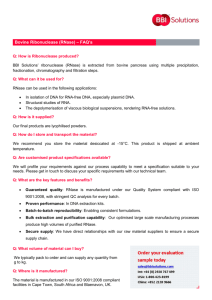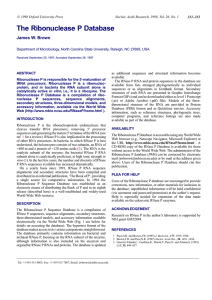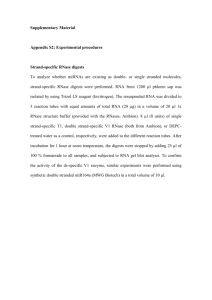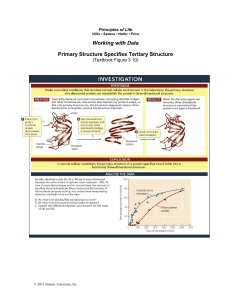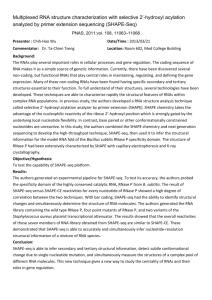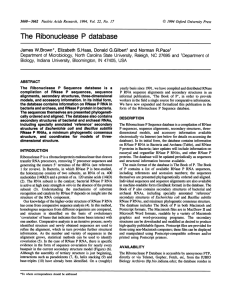The Ribonuclease P Database James W. Brown*
advertisement
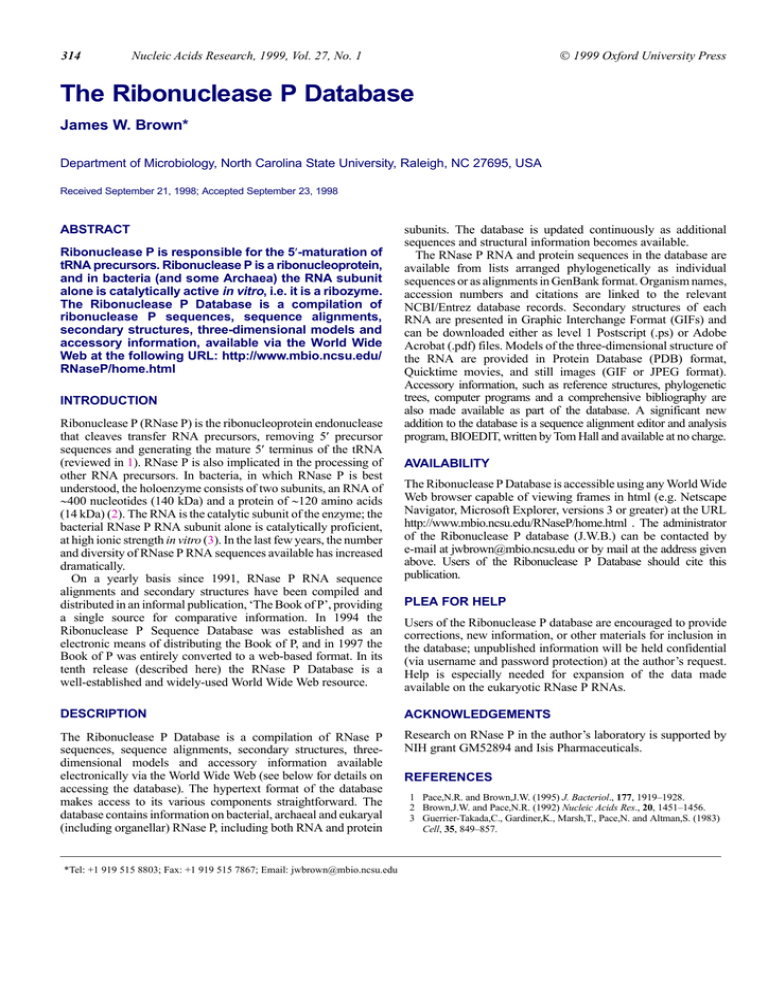
314 1999 Oxford University Press Nucleic Acids Research, 1999, Vol. 27, No. 1 The Ribonuclease P Database James W. Brown* Department of Microbiology, North Carolina State University, Raleigh, NC 27695, USA Received September 21, 1998; Accepted September 23, 1998 ABSTRACT Ribonuclease P is responsible for the 5′-maturation of tRNA precursors. Ribonuclease P is a ribonucleoprotein, and in bacteria (and some Archaea) the RNA subunit alone is catalytically active in vitro, i.e. it is a ribozyme. The Ribonuclease P Database is a compilation of ribonuclease P sequences, sequence alignments, secondary structures, three-dimensional models and accessory information, available via the World Wide Web at the following URL: http://www.mbio.ncsu.edu/ RNaseP/home.html INTRODUCTION Ribonuclease P (RNase P) is the ribonucleoprotein endonuclease that cleaves transfer RNA precursors, removing 5′ precursor sequences and generating the mature 5′ terminus of the tRNA (reviewed in 1). RNase P is also implicated in the processing of other RNA precursors. In bacteria, in which RNase P is best understood, the holoenzyme consists of two subunits, an RNA of ∼400 nucleotides (140 kDa) and a protein of ∼120 amino acids (14 kDa) (2). The RNA is the catalytic subunit of the enzyme; the bacterial RNase P RNA subunit alone is catalytically proficient, at high ionic strength in vitro (3). In the last few years, the number and diversity of RNase P RNA sequences available has increased dramatically. On a yearly basis since 1991, RNase P RNA sequence alignments and secondary structures have been compiled and distributed in an informal publication, ‘The Book of P’, providing a single source for comparative information. In 1994 the Ribonuclease P Sequence Database was established as an electronic means of distributing the Book of P, and in 1997 the Book of P was entirely converted to a web-based format. In its tenth release (described here) the RNase P Database is a well-established and widely-used World Wide Web resource. subunits. The database is updated continuously as additional sequences and structural information becomes available. The RNase P RNA and protein sequences in the database are available from lists arranged phylogenetically as individual sequences or as alignments in GenBank format. Organism names, accession numbers and citations are linked to the relevant NCBI/Entrez database records. Secondary structures of each RNA are presented in Graphic Interchange Format (GIFs) and can be downloaded either as level 1 Postscript (.ps) or Adobe Acrobat (.pdf) files. Models of the three-dimensional structure of the RNA are provided in Protein Database (PDB) format, Quicktime movies, and still images (GIF or JPEG format). Accessory information, such as reference structures, phylogenetic trees, computer programs and a comprehensive bibliography are also made available as part of the database. A significant new addition to the database is a sequence alignment editor and analysis program, BIOEDIT, written by Tom Hall and available at no charge. AVAILABILITY The Ribonuclease P Database is accessible using any World Wide Web browser capable of viewing frames in html (e.g. Netscape Navigator, Microsoft Explorer, versions 3 or greater) at the URL http://www.mbio.ncsu.edu/RNaseP/home.html . The administrator of the Ribonuclease P database (J.W.B.) can be contacted by e-mail at jwbrown@mbio.ncsu.edu or by mail at the address given above. Users of the Ribonuclease P Database should cite this publication. PLEA FOR HELP Users of the Ribonuclease P database are encouraged to provide corrections, new information, or other materials for inclusion in the database; unpublished information will be held confidential (via username and password protection) at the author’s request. Help is especially needed for expansion of the data made available on the eukaryotic RNase P RNAs. DESCRIPTION ACKNOWLEDGEMENTS The Ribonuclease P Database is a compilation of RNase P sequences, sequence alignments, secondary structures, threedimensional models and accessory information available electronically via the World Wide Web (see below for details on accessing the database). The hypertext format of the database makes access to its various components straightforward. The database contains information on bacterial, archaeal and eukaryal (including organellar) RNase P, including both RNA and protein Research on RNase P in the author’s laboratory is supported by NIH grant GM52894 and Isis Pharmaceuticals. *Tel: +1 919 515 8803; Fax: +1 919 515 7867; Email: jwbrown@mbio.ncsu.edu REFERENCES 1 Pace,N.R. and Brown,J.W. (1995) J. Bacteriol., 177, 1919–1928. 2 Brown,J.W. and Pace,N.R. (1992) Nucleic Acids Res., 20, 1451–1456. 3 Guerrier-Takada,C., Gardiner,K., Marsh,T., Pace,N. and Altman,S. (1983) Cell, 35, 849–857.
